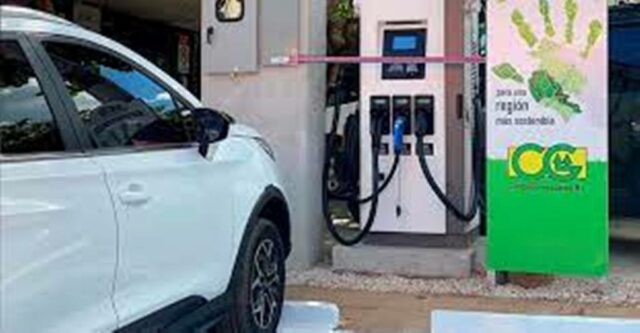The province of Guanacaste strengthens its fast-charging service for electric cars. The electric cooperative Coopeguanacaste R.L inaugurated three new points: On the boulevard of Playas del Coco and in its offices located in Paquera and Nicoya. By 2022, it will place another fast charger at the Flamingo Marina.
It continues to create conditions for electric mobility becoming a reality that allows progress on the issue of decarbonization of the economy. The enabling of these other fast charging points will allow those who live or visit places in these parts of Guanacaste and have an electric vehicle, to have the resource safely to move knowing that they have the facility.
More responsible and sustainable ways of mobilizing
“Joining in this effort to create the conditions for the use of this type of vehicles that use renewable sources shows the commitment to change towards the implementation of more responsible and sustainable ways of mobilizing and reducing our dependence on fossil fuels” explained Miguel Gómez, general manager of Coopeguanacaste, RL
The fast or L3 chargers that they will install already have a rate set by the Public Services Regulatory Authority (ARESEP) that establishes an amount of 150 colones per minute of charging (price plus VAT).

Each charger will have a special dataphone installed through which, without having to join any platform or have an application, users can charge and pay using their credit cards. Payment in cash or transfer will not be possible.
“The chargers we buy are 90 kW and with 3 connectors. In addition, the payment mechanism that we have planned is basically by using a credit card directly to the charger’s dataphone and without the need for any affiliation to any application,” explained Yuri Alvarado, Distribution Manager.
The investment in the recharging centers implies for the Cooperative of around $ 200,000 (128 million colones). The 4 fast-charging stations for electric vehicles join the charging stations installed in the branches of: Nicoya, Huacas de Santa Cruz, Sardinal de Carrillo and the central offices of Coopeguanacaste, R.L. in Santa Cruz.
In downtown Nicoya, the one that was in the Cooperative’s branch will be replaced by a new one with fast charging and the one that was in Nicoya will go to the Juanilama Solar Park located in Belén de Carrillo on route 21.
With the approval in 2017 of the Incentives and Promotion Law for Electric Transportation (No. 19 744), a legal framework is established that, among other things, will make it possible to import electric vehicles with tax exemptions that will benefit users and those who bet on this type of mobility.
Greenhouse gas impact reduction with electric vehicles
Costa Rica is internationally recognized for its efforts in generating electricity from renewable sources; However, in terms of transportation, the country has a great debt due to its high consumption of hydrocarbons.
The country’s electricity generation in recent years has been with clean sources between 98.2% and 99%, but the consumption of fossil fuels increased due to the growth in the number of vehicles.
The Ministry of Environment and Energy (MINAE) through the National Electric Transportation Plan 2018-2030 estimates that the transportation sector is responsible for 83% of hydrocarbon consumption and that it generates 54% of the country’s CO2 emissions. Of that percentage, 41% comes from private cars.
The reduction of the impact on the emission of greenhouse gases (GHG) with the incorporation of electric vehicles could reach 14.5 million tons of CO2 by 2050, according to MINAE forecasts, hence the importance of supporting the electric mobility plans, building infrastructure, generating facilities for the acquisition of vehicles, technically training specialists in these automobiles and developing electricity and public transport tariff methodologies.
Resonance has been created to bring together a community of digital nomads, entrepreneurs, innovators, wisdom keepers, alternative thinkers, mentors and light leaders from all over the planet to bridge the gap between demanding work and living a lifestyle that offers the opportunity to live and work in an environment that is nourishing and supportive.
